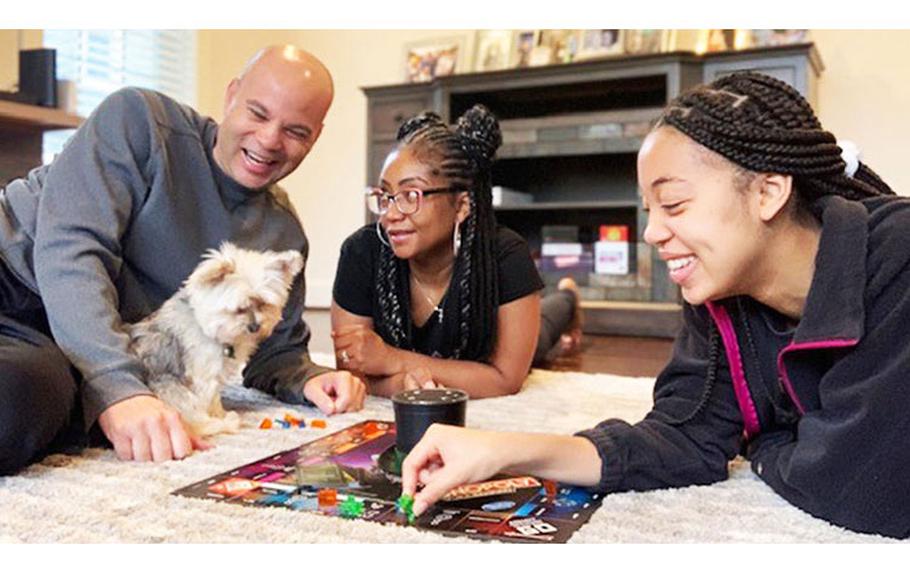Community News
'Home sweet home' leaves a sour taste for some quarantine-weary
Military Health System Communications Office May 29, 2020

Army Col. Nathan Keller and his family have enjoyed group activities during the COVID-19 pandemic, but they also schedule solo time. (Courtesy photo Army Col. Nathan Keller) ()
As physical distancing continues in efforts to avoid the spread of COVID-19, the old saying "there's no place like home" might be sounding bittersweet. Whether people live alone or with others, they may be experiencing fear, anxiety, and frustration over restricted movement.
The Centers for Disease Control and Prevention recently released guidance about businesses and workplaces reopening. But health care experts say until there's widespread testing and a vaccine for the contagious virus, staying home as much as possible remains the safest course of action. So how can people cope with the continued challenges of being largely confined to home?
"Human beings are social creatures and need to maintain connections through a variety of relationships that offer social support and a sense of security," said Army Col. Nathan Keller, Ph.D., director of the student counseling center at Uniformed Services University of the Health Sciences in Bethesda, Maryland.
"When we're unable to do that, we can become frustrated and anxious," said Keller, who's also a clinical social worker. That's why it's important to focus on the positive aspects of your particular living situation, mental health experts say, and use available resources to stay connected to sources that help relieve stress.
"Being confined with others is beneficial because it's a collective experience," said Keller, who lives with his wife and their 17-year-old daughter. "You have the ability to commiserate, and to understand this isn't something that's happening only to you. You can focus on taking care of each other, remind one another of positive memories, and create new shared experiences."
For those who live alone, "Maybe there's a sense of relief or gratitude that you can focus on what you need to do without any disruptions," said Navy Lt. Cmdr. Tarah Lewis, a psychiatric mental health nurse practitioner and assistant professor in USU's Graduate School of Nursing.
"And you can devote as much time as you want on personal projects," said Lewis, who lives alone in what she describes as a tiny one-bedroom apartment in downtown Bethesda.
"I don't even have a pet," she said. "And I don't have a car. I'm used to being outside, walking around and going to restaurants and shops, and that kind of thing."
Lewis said people who live alone may be particularly vulnerable to feeling lonely, "maybe even envious of others," she said. "You go on social media and see families going camping, or roommates cooking brunch together."
Reaching out to others helps.
For Lewis, that means online fitness challenges with friends, and playing games such as "two truths and a lie" during after-work video conferences with co-workers.
"That was really fun because I learned things about my colleagues that I never knew," Lewis said. "I actually felt more connected with some of them than I ever did before, even though I went into the office every day" pre-pandemic.
People who live with others need to find time alone, "even in a crowded house," Keller said. "Focusing on yourself when you live with others may sound selfish, but you need that self-care time so you have the patience and energy to support others."
Alone time might mean listening to music, dancing solo, reading, going for a walk or run, or meditating. "Think of those things that you find joy in, and put those in your toolbox," Lewis said.
Whether on your own or with others, Keller and Lewis suggest the following:
Stick with a schedule. "Having a routine provides structure and some sort of normalcy," Lewis said. Keller said his family created a plan so they're getting up at the same time, working the same hours, and eating meals together. Their schedule also allots personal and family fun time.
Move your body. Exercise helps you feel better physically and mentally.
Cut yourself some slack. "There are days where you're not going to feel as productive as you usually are, or you're not going to be the perfect parent or spouse," Keller said. "It's OK to have those moments."
"It's OK to not feel OK," Lewis added. "There's no shame in saying, I'm feeling off, and I need to talk to somebody." The Department of Defense's Psychological Health Center of Excellence offers information on mental health resources including call centers and mobile apps.
Keep your eye on the prize. "Eventually, this will pay off, and we're going to come out of it more resilient," Keller said. "We're not going to be stuck like this forever."
Lewis said, "The way I see it is, we're at war. And the boots on the ground are the health care providers and front-line workers. And my role? I'm going to practice physical distancing. I'm going to wash my hands. I'm going to cover my face if I have to be around other people. I'm going to do my part. Those are things that I have control over, and I take great comfort in that."